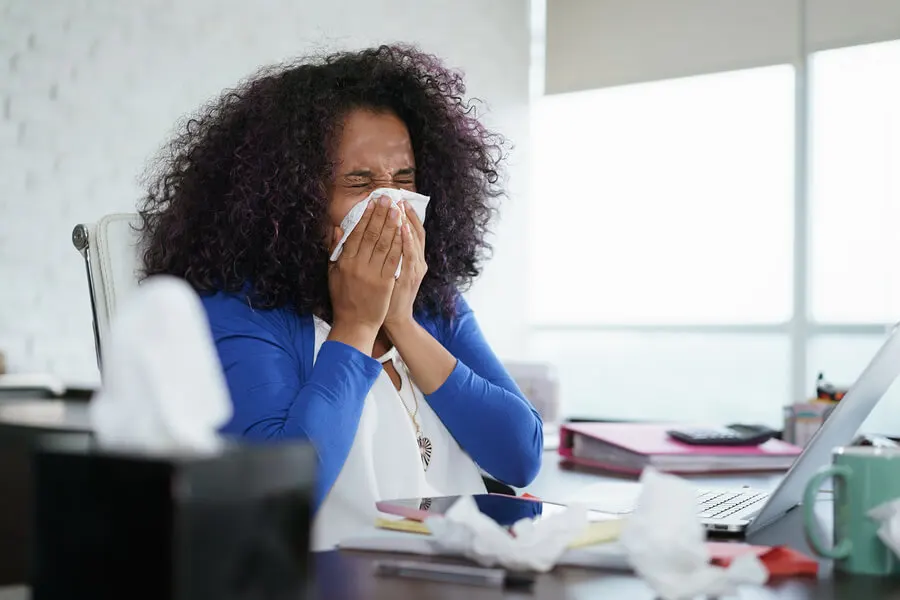Why Do I Get Sick So Often?


Reviewed and approved by the doctor Nelton Abdon Ramos Rojas
One of the most frequently asked questions in doctor’s offices is, “Why do I get sick so often?” Many people want to answer this question, as they constantly suffer from flu, colds, aches, pains, digestive problems, prolonged tiredness, and many other symptoms that make them feel sick.
The truth is that many factors can explain why some people tend to feel sicker than others. Nervous system disturbances, immune system function, and hormonal changes have a lot to do with this. To learn more, here are some possible causes.
Why do I get sick so often? The possible causes
The Centers for Disease Control and Prevention warn that many chronic diseases are associated with poor lifestyle habits, such as smoking, exposure to secondhand smoke, alcohol consumption, sedentary lifestyle, and poor diet.
Therefore, to answer the question “Why do I get sick so often,” it’s first important to review your lifstyle habits. Leading an unhealthy lifestyle can be the trigger of many diseases. However, other causes should not be ruled out.
Let’s take a look.
Anxiety
When anxiety levels increase, its clinical manifestations go beyond the emotional. Many patients experience digestive discomfort, such as nausea, stomach pain, or vomiting.
In fact, a study published in the Scandinavian Journal of Gastroenterology found a link between gastrointestinal symptoms and anxiety disorders and depression.
Other symptoms that are linked to anxiety include:
- Excessive perspiration
- Difficulty breathing or a feeling of suffocation.
- Dizziness
- Trembling
- Increased heart rate
You might find this article interesting: Check Your Anxiety Levels with this Test

When to see a doctor
Feeling sick often with these symptoms should be reason enough to see a doctor. Once it’s determined to be due to anxiety, they may suggest a consultation with a mental health professional, such as a psychologist or psychiatrist.
Fortunately, both occasional cases of anxiety and anxiety disorders can be addressed in many ways. Psychotherapy, coupled with lifestyle changes, may be sufficient. In some cases, medication may be necessary.
Chronic stress
Stress is a natural reaction of the body to certain threats. However, when it occurs chronically, its impact on health and well-being is not good. Getting sick too often can be a sign of being subjected to too much-unmanaged stress.
As detailed in research published in Future Science OA, stress affects immune system functions, alters the nervous system, and compromises heart health. Even when it gets out of control, it’s associated with other ailments such as headaches and lower back pain.
Among other things, other signs of stress-related illness are:
- Lack of energy or fatigue
- Digestive problems, such as diarrhea, nausea, and cramps
- Insomnia and difficulty sleeping
- Frequent infections, such as flu, colds, and urinary problems
When to see a doctor
Both doctors and psychologists can help develop strategies to mitigate the effects of stress. It’s important to seek a consultation if symptoms affect the quality of life.
Treatment can focus on the underlying cause of the stress and the resulting illness itself. As such, it may include:
- Psychological therapy
- Medications
- Lifestyle changes
Immune problems
Problems affecting the immune system may explain why many people constantly get sick with flu, colds, and infections. When defense mechanisms can’t respond well against pathogens, these illnesses may occur.
In fact, as research published in the Journal of Immunology Research explains, immune system disorders are also implicated in an increased risk of heart and metabolic diseases.
People with a weak immune system may experience:
- Frequent colds and flu (fever, congestion, difficulty breathing, general malaise, etc.)
- Bronchitis and asthma
- Digestive problems, such as constipation or diarrhea
- Joint pain
- Food intolerances
- Skin irritation, itching, and rashes

When to see a doctor
You should always see your doctor whenever you have signs of a weak immune system. The doctor must know if symptoms of illness frequently occur to start making a diagnosis.
Depending on the clinical manifestations, different diagnostic tests will be carried out. This will also determine the treatment.
Anemia
Anemia is a disease caused by the low production of hemoglobin, a part of red blood cells whose function is to facilitate oxygen transport in the blood. The consumption of some medications, iron and vitamin B12 deficiency, pregnancy, and some chronic diseases may be behind anemia.
When it develops, it’s normal to feel sick more often, as the feeling of tiredness, breathing difficulties, concentration problems, and dizziness increase. Even the skin begins to look paler and dark circles under the eyes are more noticeable.
When to see a doctor
At first, many people overlook the symptoms of anemia because they often think it’s something temporary. However, it’s important to consult a doctor at the first signs of anemia to delay treatment.
Depending on the cause, the doctor may suggest dietary adjustments, supplements, or medications.
Read this article: Nutrients and Exercises to Maintain a Healthy, Clean, and Strong Liver
Are there other reasons for feeling sick very often?
At this point, we already have several possible causes as to why you get sick often. However, it’s worth mentioning that other factors can also explain it. Dehydration, a nutrient-poor diet, and lack of sleep can also lead to illness.
It’s also common to get sick from working in healthcare environments (clinics, hospitals, etc.), not washing hands properly, or sharing the same environment as people with infectious diseases. In light of this, it’s important to ensure good hygiene and take strict safety measures.
All cited sources were thoroughly reviewed by our team to ensure their quality, reliability, currency, and validity. The bibliography of this article was considered reliable and of academic or scientific accuracy.
- Baiju, R. M., Peter, E. L. B. E., Varghese, N. O., & Sivaram, R. (2017). Oral health and quality of life: current concepts. Journal of clinical and diagnostic research: JCDR, 11(6), 1-6. https://www.ncbi.nlm.nih.gov/pmc/articles/PMC5535498/
- Bagatini, M. D., Cardoso, A. M., Santos, A. A. D., & Carvalho, F. B. (2017). Immune system and chronic diseases. Journal of Immunology Research, 2017, 1-3. https://www.ncbi.nlm.nih.gov/pmc/articles/PMC5429960/
- Burgner, D., Jamieson, S. E., & Blackwell, J. M. (2006). Genetic susceptibility to infectious diseases: big is beautiful, but will bigger be even better?. The Lancet infectious diseases, 6(10), 653-663. https://pubmed.ncbi.nlm.nih.gov/17008174/
- Childs, C. E., Calder, P. C., & Miles, E. A. (2019). Diet and immune function. Nutrients, 11(8), 1-9. https://www.ncbi.nlm.nih.gov/pmc/articles/PMC6723551/
- Goto, Y., Hayasaka, S., Kurihara, S., & Nakamura, Y. (2018). Physical and mental effects of bathing: A randomized intervention study. Evidence-based complementary and alternative medicine, 2018, 1-5. https://www.ncbi.nlm.nih.gov/pmc/articles/PMC6011066/
- Mariotti, A. (2015). The effects of chronic stress on health: new insights into the molecular mechanisms of brain–body communication. Future science OA, 1(3), 1-6. https://www.ncbi.nlm.nih.gov/pmc/articles/PMC5137920/
- Medic, G., Wille, M. & Hemels, M. E. (2017). Short-and long-term health consequences of sleep disruption. Nature and science of sleep, 9, 151-161. https://www.ncbi.nlm.nih.gov/pmc/articles/PMC5449130/
- Turner, J., Parsi, M. & Badireddy, M. (2022). Anemia. StatPearls. Consultado el 6 de agosto de 2024. https://www.ncbi.nlm.nih.gov/books/NBK499994/
- Xun, Y., Shi, Q., Yang, N., et al. (2021). Associations of hand washing frequency with the incidence of illness: a systematic review and meta-analysis. Annals of translational medicine, 9(5), 1-11. https://www.ncbi.nlm.nih.gov/pmc/articles/PMC8033386/
- Wellington, D., Laurenson-Schafer, H., Abdel-Haq, A., Dong, T. (2019) IFITM3: How genetics influence influenza infection demographically. Biomedical Journal; 42 (1): 19-26. https://www.sciencedirect.com/science/article/pii/S2319417018305675
- NIH.(s/f). Entender los trastornos de ansiedad. Consultado el 6 de agosto de 2024. https://salud.nih.gov/recursos-de-salud/nih-noticias-de-salud/entender-los-trastornos-de-ansiedad
- Herrera, B. P. (2012). Las principales corrientes en psicoterapia. La Mente es Maravillosa. Consultado el 6 de agosto de 2024. https://lamenteesmaravillosa.com/las-corrientes-psicologicas/
This text is provided for informational purposes only and does not replace consultation with a professional. If in doubt, consult your specialist.








